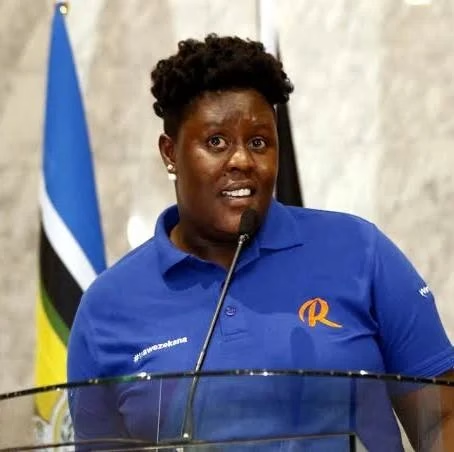When Raila and Ida Odinga welcomed their youngest daughter in 1990, they named her Winnie — a name heavy with meaning, power, and history. She was named after Winnie Madikizela-Mandela, the fearless South African freedom fighter who stood tall beside Nelson Mandela during apartheid.
Decades later, Kenya’s own Winnie Odinga has grown into a woman who embodies the same resilience, courage, and defiance that inspired her parents to give her that name.

A Name Born from Struggle and Symbolism
In 1990, the year Winnie Odinga was born, Africa was changing. Nelson Mandela had just been released from prison, marking the beginning of South Africa’s new dawn. Across the continent, liberation and democracy were in the air.

Raila and Ida Odinga — themselves symbols of Kenya’s pro-democracy struggle — saw in Winnie Mandela a reflection of their own political battles. To them, naming their daughter Winnie was more than admiration; it was a declaration.
They wanted their child to carry a name that represented strength, conviction, and courage to speak truth to power. It was a prayer that their daughter would never shy away from standing up for justice, even when it came at a cost.
Growing Up in the Shadow of Resistance
From her earliest days, Winnie Odinga was surrounded by politics and protest. Her father, Raila Odinga, was detained several times for opposing dictatorship. Her mother, Ida, fought for women’s rights and education despite government intimidation.
In that environment, Winnie didn’t just inherit a famous surname — she inherited a revolutionary spirit.
Like the woman she was named after, Winnie grew up understanding that power often comes with sacrifice and that leadership is not given but earned through conviction.
Bold, Unapologetic, and Unafraid
Winnie Odinga’s public persona mirrors much of Winnie Mandela’s fearless nature. She’s outspoken, often unfiltered, and fiercely loyal to the causes she believes in.
On social media, she doesn’t mince words when addressing political hypocrisy or social inequality. Her digital voice — sharp, witty, and commanding — has earned her both admiration and criticism. Yet, like her namesake, she doesn’t retreat from confrontation.
When critics attack her family or question her role in politics, Winnie stands her ground. “I was born into this struggle,” she once remarked — echoing the same defiance that defined Winnie Mandela’s life.
A Modern Fighter for a New Generation
While Winnie Mandela fought against apartheid, Winnie Odinga is battling a different kind of oppression — the silencing of young voices in Kenya’s political system.
She’s part of a generation that refuses to be sidelined, pushing for youth participation, women’s inclusion, and accountability in government.
Her position at the East African Legislative Assembly (EALA) has given her a regional platform to advocate for economic integration and social justice.
She’s often seen as the modern face of the Odinga legacy — carrying the torch of rebellion and reform into the digital age.
Balancing Legacy and Individual Identity
Being named after a global icon can be both an honor and a burden. Winnie Odinga has acknowledged the weight of expectation that comes with her name and her family background.
Yet, she’s carving out her own path — one that honors the past while adapting to present realities.
Unlike Winnie Mandela, who was often defined by her husband’s struggle, Winnie Odinga is defining herself through technology, advocacy, and youth mobilization. She blends activism with modern communication — from podcasts and tweets to parliamentary debates — proving that leadership can evolve with time without losing its fire.
From Tribute to Transformation
For Raila and Ida Odinga, naming their daughter after Winnie Mandela was a tribute to courage.
For Winnie Odinga herself, living up to that name has become a lifelong mission.
Both women — born in different eras and nations — share remarkable similarities:
- Fierce loyalty to their people
- Courage to defy authority
- Deep compassion for the oppressed
- And an unbreakable belief in justice
Winnie Odinga’s story shows that names are not just words; they’re destinies shaped by example. She’s not only carrying the memory of Winnie Mandela — she’s rewriting it in Kenya’s own political narrative.
Conclusion
From Soweto to Nairobi, the name Winnie continues to symbolize resistance, leadership, and feminine strength.
Winnie Odinga’s journey — from a child named after an African hero to a rising political figure — is proof that names can indeed carry power.
Her life so far reflects her parents’ hopes: that she would stand tall, speak boldly, and fight fearlessly — just like the woman she was named after. Relates story https://www.whispers.co.ke/979/celebrities/2025/fidel-odinga-death-explained-the-mystery-behind-raila-odingas-sons-tragic-end/
